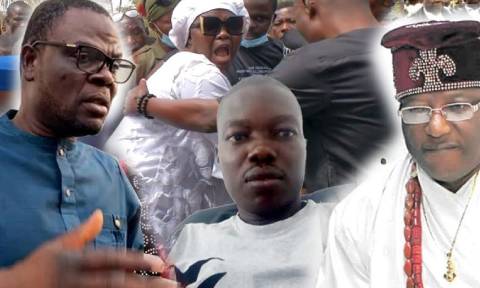THE LEAN crowd that turned out to see this year’s edition of African Movie Academy Awards (AMAA), which held at its traditional venue, the Gloryland Culture Centre, was expected. It was expected in the sense that the organisers stubbornly refused to take the easiest option of postponing the awards (like Kebbi State did with Arugungu Fishing Festival which was put on hold for unofficial reasons bordering on President Umaru Musa Yar’Adua’s ill health) indefinitely for reasons other than lack of adequate funding.
The signs that things were no longer the way it used to be, funding-wise, started to manifest early during the preparation for this year’s edition of AMAA, which is in its sixth year. And not one to quit because she has been well schooled in the saying that quitters don’t win and winners do not quit, Madam Peace Anyim-Osigwe, the woman whose name (like that of Chief Tony Okoroji, who started the culture of music awards in Africa with Nigerian Music Awards in the mid-1980s here in Nigeria) will be written in letters of gold on the pages of history as the pioneer of the first ever movie award that rewards and appreciates practitioners in the world of make-believe in Africa, and his team of energetic, creative and bright minds that included the likes of Tony Anih, Shauib Hussein, Tope Ajayi, Steve Ayorinde to mention a few, were not scared by the prospect of having to work with a shoestring budget. Rather, it made them stronger in their belief in that popular maxim, especially in the entertainment industry, that no matter what, ‘the show must go on.’ They saw the low budget challenge from its traditional sponsors – the oil-rich Bayelsa State and UBA, Africa’s global bank, which was occasioned in part by the economic meltdown, the ongoing Sanusi Lamido Sanusi’s banking reform that has claimed many jobs and the politically induced investigation of officials of Bayelsa State Government by the Economic and Financial Crimes Commission (EFCC) for fraud as an opportunity to explore the possibility of attracting funding/sponsorship support from other sources and went about it swiftly.
First, they started with a seminar at which the enormous potentials of Nollywood, Nigerian film industry, as an alternative to the black gold (petroleum) in terms of foreign exchange earner and provision of employment, was once again highlighted. The event which, held in Lagos, drew guests from all walks of life.
Next was what she called ‘an evening with sponsors’ that was held at Eko Hotel, Lagos. With lots to eat and drink, Madam Peace (for what is how most media men call her) took us on a short but interesting journey into the history of AMAA, how the first democratically elected Governor of Bayelsa State and the President General, Ijaw Nation, Chief Dieprieye Alamieyeseigha, did the unthinkable in this clime by agreeing with much ado that the state would partner AMAA as a way of opening the door of Bayelsa State’s hospitality, culture and tourism potentials/sites to the world.
Present at this exclusive evening of fine food, good spirits and wines were the representatives of the title sponsor, UBA, which came on board four years ago; representatives of other blue- chip multinationals like Julius Berger Nigeria Plc, the construction giant whose signature, B, can be seen on major roads, bridges, public buildings across Nigeria. The real icing on the cake that night was the arrival of the Governor of Bayelsa State, Timi Sylva, who flew in straight from Awka, where he had gone to monitor the governorship election at which his party’s candidate, Professor Chukwuma Charles Soludo lost to Peter Obi, to endorse AMAA. He made it clear that it had become extremely difficult for the state to continue to shoulder the financial responsibility of hosting AMAA year in, year out, and called on corporate Nigerians to come aboard the AMAA train before it grinds to a halt due to no other fault than lack of fund. Sylva, who inherited the AMAA funding ‘burden’ from two other previous governors of the state: Alamieyeseigha and Goodluck Jonathan, enumerated the benefits a-would-be sponsor stands to reap by using AMAA as a vehicle to reach its target audience.
The same gospel of funding through sponsorship was later on carried to Ghana at a party held to unveil films and actors/actresses who were nominated for the award. At this party, which was held at one of Ghana’s five-star hotels with representatives of Ghana and Bayelsa governments, scores of popular movie people from Ghana, Nigeria, South Africa, Kenya were in attendance. Madam Peace again appealed for support, this time from corporate Africa. She made the appeal in a speech she delivered extempore at the party; a speech in which she told the audience especially the movie makers in the hall to use the powerful lens of their camera by which she meant film, which others, the West, in particular uses to showcase the continent in bad light, to tell positive legends of Africa. For this party, AMAA airlifted and fed almost every guest except those of Ghanaian origin that attended.
With all these marketing strategies done, one had expected that this year’s AMAA would reap bountifully from sponsors but the reverse was the case. It turned out to be the worse in terms of funding. Three weeks to the day, movie stars from within and without the continent were expected to converge on Yenogoa, the capital of Bayelsa State, AMAA office in Lagos was not sure where the funds that would make for a hitch-free award night would come from.
That AMAA has survived this far is partly due to the huge financial intervention that Madam Peace has enjoyed from his brothers, the Ayim – Osigwes, who are behind the hugely popular Anyim-Osigwe Foundation Lecture that attracts ex-world leaders. They are the ones who shell out the huge funds that AMAA needs to kick-start every year before that of UBA and the Bayelsa State Government portion, which usually comes months after the event had been held.
It was of course by the special grace of God that the award held at all this year because it was just when preparation for the event was coasting home that EFCC beamed its vindictive search light on Bayelsa State and like they say, a man whose house is on fire will not be chasing rats. Sylva and his officials cannot be contending with EFCC’s harassment and still find time to think of releasing fund for a ‘mere’ programme like AMAA.
While Madam Peace and her team went cap in both hands begging for sponsors who never came, corporate Nigeria and some state governments were busy spending hard currencies on awards like KORA, ION Film Festival or importing foreign musicians for performances in selected cities across the country. Promoters of KORA Award, a music awards event, were in the country with the tempting promise of hosting the award in Nigeria and got $2.5 million and $7.5 million from Cross River and Lagos states respectively and disappeared into the thin air with the mind-boggling amount without living up to their promise to organise the award in Calabar or Lagos.
As Ernest Coovi Adjovi, the man behind KORA, was smiling to the bank, thanks to the two states, those behind ION Film Festival were also making a kill in Port Harcourt, Rivers State, where Governor Chibuike Rotimi Amaechi, doled out five million euros in support of the organisers’ choice of Port Harcourt as the host for the 2009 edition of the festival. That was not all, Zain Nigeria, which in 2008 pulled out of a sponsorship talk with Okoroji and his fellow organisers of Nigerian Music Awards (NMA) chipped in N100 million as its sponsorship support for the award, same for Skye Bank Plc, though the amount it gave out was not made public. However unlike, KORA Awards, ION Film Festival held.
We can go on and on but suffice to say that while all the money ION raked in as sponsorship deal in Nigeria was close to a billion naira, AMAA got less than N100 million of the projected N300 million from its two known sponsors. With this kind of budget, there was no doubt the award ceremony for this year will not exude the kind of glamour and razzamatazz the previous editions had been known for. That it



















